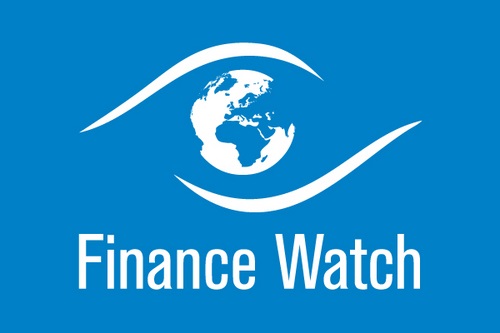Ten Years After: Report and Global Day of Action against Business as Usual
Finance Watch published a comprehensive assessment of post-crisis financial regulation in Europe

Brussels, September 2018 – The collapse of one of the largest investment banks, Lehman Brothers, ten years ago must serve as a powerful reminder of the fragility of our financial system. Over the last 30 years, finance has lost its connection to the economy and the needs of society. In its comprehensive analysis of post-crisis regulation, Finance Watch demonstrates that the opportunity for a fundamental realignment of the global financial sector has been missed and that none of the structural vulnerabilities that led to the financial crisis of 2008 have been tackled in a decisive way.
* A thorough reform of the institutional governance framework of the ‘global financial architecture’, long overdue, has not taken place.
* ‘Systemically important’ financial institutions have changed little in size and complexity and still pose a major risk to financial stability, with capital requirements only marginally stronger and resolution regimes largely untested.
* The nearly limitless release of liquidity into the financial system by the world’s major central banks has re-routed massive flows of capital and created new ‘bubbles’ that threaten to destabilise the system.
* Artificially low interest rates, misaligned incentives, risky lending and ‘moral hazard’ have conjured up a worryingly familiar ‘déjà vu’ of soaring debt, high levels of non‑performing loans and the looming spectre of large-scale defaults when interest rates rise.
* With every regulatory step, activities have been allowed to migrate towards the poorly regulated ‘shadow banking’ sector, which has grown in leaps and bounds.
Christian M. Stiefmueller, author of the report, said:
“Compared to 2008/09, the international community’s arsenal for dealing with another global financial crisis has been depleted. Whereas the risks facing the financial systems have remained broadly unchanged, the fiscal and monetary tools available to governments and central banks have been dramatically reduced.
“Even worse, the ‘regulatory pendulum’ is swinging back with a vengeance: the forthcoming Banking Package (CRR II/CRD V/BRRD II) shows every sign of a beginning deregulatory backlash. Warnings by international organisations, central bankers, supervisors and other experts go largely unheeded.”
Benoît Lallemand, Secretary General of Finance Watch, added:
“The financial lobby has been very efficient in steering the post-crisis debate away from fundamental changes. Instead of focusing on the root-cause of the crisis – 30 years of financialization of the economy – the post-crisis discussion has been framed only in terms of making the existing system a bit safer.
“Citizens are outraged that they had to pay to bail out banks and are still suffering today from the consequences of the crisis without seeing any meaningful change in how finance works and its role in society. As the rise in political extremism since the crisis shows, this poses a grave danger to our democracies.
“Ten years on from the crisis, a Change Finance movement is growing at global and national level: this should provide hope for citizens who are looking for credible alternatives to 30 years of deregulation, liberalization and booming inequalities.”
Finance Watch has initiated together with more than 60 organisations the “Change Finance Coalition” aiming to transform the financial system into a tool to accelerate a transition to an economy serving people and the planet. The Coalition is organising a “10 Years On”-campaign with more than a hundred actions worldwide on the 15th September 2018 to engage citizens into a call for change.
ABOUT FINANCE WATCH
Finance Watch is a European, not-for-profit association of civil society Members, dedicated to making finance work for the good of society. It works for a financial system that allocates capital to productive use through fair and open markets, in a transparent and sustainable manner, in line with society’s needs and without exploiting or endangering society at large.
Finance Watch Members are supported by a professional full-time secretariat recruited mainly from the financial and policy sectors, with strong communications and stakeholder engagement capacities, to conduct advocacy and provide technical know-how and coordination for our civil society network.
For more information about the Finance Watch governance and funding, please visit the Finance Watch website:
http://www.finance-watch.org/about-us/governance-and-funding

